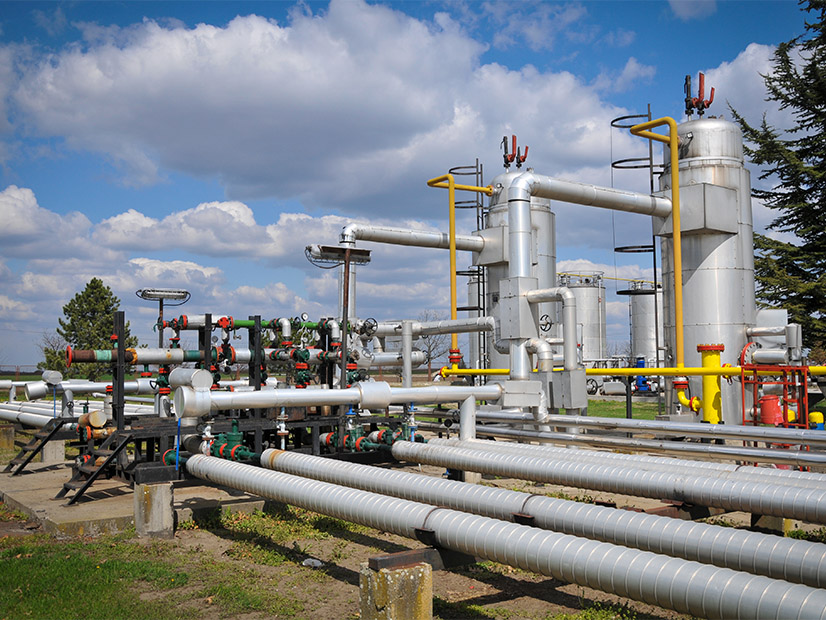Market monitors from all of FERC’s six jurisdictional grid operators have endorsed calls for a NERC-like gas reliability organization.
The monitors sent the commission a letter Oct. 10 endorsing the recommendations from the North American Energy Standards Board’s (NAESB) Gas Electric Harmonization Forum, issued in July. (See NAESB Forum Chairs Push for Gas Reliability Organization.)
“In a time of unprecedented transformation, the reliability of the bulk electric system (BES) is increasingly dependent on the reliability of natural gas-fired generators,” the monitors wrote. “As noted in multiple forums, recent winter storm and summer heat events have highlighted that the electric and natural gas systems do not function in an integrated manner when needed most, resulting in the loss of hundreds of lives and over $100 billion in economic damage from the 2021 and 2022 winter storms alone.”
The letter was signed by PJM Independent Market Monitor Joe Bowring, SPP Market Monitoring Unit Vice President Keith Collins, CAISO Department of Market Monitoring Executive Director Eric Hildebrandt, ISO-NE Market Monitoring Executive Director David Naughton and Potomac Economics President David Patton, the market monitor for MISO and NYISO.
“We recognize that the report’s primary recommendation is that an optimal solution likely requires federal legislation that creates a NERC-like organization for the natural gas industry,” they said. “However, that outcome is uncertain. Given that uncertainty, we strongly support FERC’s past, current and future efforts to improve the reliability of natural gas-fired generators within the North American BES.”
FERC Chairman Willie Phillips highlighted the letter and its endorsement of the recommendations at the commission’s regular meeting Thursday.
“The primary recommendation of the NAESB report is the establishment of a NERC-like organization for the natural gas industry,” Phillips said. “And I welcome the support of all six independent market monitors, not only for NAESB’s recommendations, but their encouragement that FERC, quote, ‘take actions to use recommendations in this report.’ I could not agree more.”
The market monitors think gas-electric harmonization is a key issue that needs to be addressed, Bowring said in an interview.
“It’s essential to maintaining the reliability of electric power markets as we … transition to more renewables,” Bowring said. “We believe that gas is going to continue to be necessary. And it’s essential that to the extent possible, we get better information, more transparency and more coordination between the two industries.”
While the recommendations are national, Bowring said that they leave enough room for the different regional markets to adapt them to their specific needs.
“There needs to be somewhat different solutions, depending on the market, for sure,” Bowring said.
For instance, PJM currently has a lower level of renewables than most of the ISO/RTOs, but it is facing a very high level of expected coal retirements and that means even more gas will be needed, he said.
Bowring said the most important recommendations from NAESB center on transparency. In PJM, it would benefit to know when pipelines invoke their tariffs to require generators to take the same amount of gas at all hours — which impacts power plant’s ability to ramp up and down — and when they require strict adherence to their nomination schedules, because the gas trading day and power days do not align.
“One of the things that happened during Elliot was that PJM was not aware of these long nomination periods, and therefore they called on resources that couldn’t get gas because they hadn’t nominated it,” Bowring said.
Electric-natural gas harmonization has been a concern for years. Winter Storm Elliot last December was just one of five winter reliability events over the past decade that would have benefited from improved coordination. (See Déjà Vu as FERC, NERC Issue Recommendations over Holiday Outages.)
Although the years of talk have not produced enough changes, Bowring said he was hopeful the momentum around the issue would lead to substantive reforms this time. Dealing with the issue will involve both industries coming together to develop rules that are consistent with their relative incentives.
“The business models are somewhat inconsistent. But there have to be ways to coordinate,” Bowring said. “The idea is not to force anything on the pipelines, or force anything on the generators. But I think it’s in both sides’ interest to coordinate. For whatever reason, it hasn’t happened, and I’m hoping this is a wake-up call to both sides.”




